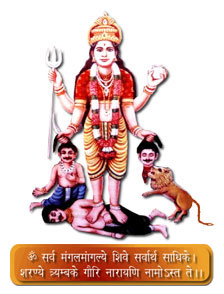Facts:
Sanskrit Glossary:
"Guru Brahma, Guru Vishnu, Guru Devo Maheshwara Guru Sakshaat ParaBrahma Tasmai Sri Gurave Namaha"
Guru is Brahma, Guru is Vishnu, Guru is God Maheshwara Guru is Parabrahma itself, so my obeisance to Guru.
Guru is a teacher.
There are three principal deities Brahma – Creator of the Universe Vishnu – One who maintains life Mahesh – One who destroys everything Parabrahma – Almighty
- Gurubandhu – male (Disciples of the same guru)
- Gurubhagini – Female
- Bandhu – Brother
- Bhagini – Sister
- Param – Extremely
- Pujya – Fit to be worshipped
- Sadguru – True virtuous. Guru, an essay can be written on what is sadguru. (Best guru)
- Bhagwan – God
- Geeta – Sheemad Bhagwat Geeta, (the authentic Religious Book).
- Prabhu – Master
- Maharaj – Big King (religious sense)
- Bhaktisampraday – Bhakti sect.
- Bhakti – Devotion
- Worship – One method to achieve God or moksha
- Mukti – No rebirth
- Namsmaran – Jap – repeating the holy mantra.
- Mantra – Charm (The word when uttered protect you and your mind ).
- Visharad - proficient, sahitya
- Wangmay – whole lot of different types of literature
- Nirtya – All the while, at a particular time
- Upasana- worship
- Dhyandharana – Meditation
- Nityanemas – Daily religious routine
- Mahalaxmi – Godess of money, prosperity
- Sadhana – Religious rites
- Shree Kshetra – Holy place / land
- Darshan – To visit for paying obeisance
- Anuragha – favour blessings
- Shaktipat – Induction of transfer of (holy) energy into other individuals
- Gurutva – Superiority
- Paramarth – Benevolent, charity
- Namah - (Namaskar) – salutation, paying obeisance (salutation to god, parents)
- Yeti – sanyasi, hermit
- Arya) belong to Aryan race, sir
- Audambar – it is big tree. Its believed that god data is always present under the tree
- Ashtasatvikbhav – When a devotee makes progress in worshiping God.
- Mai – Mother
- Guru Charitra – biography of guru.
- Rangoli – Milk whilte stone power.
- Kuldaivata - the deity of deities of the family.
- Vaidya or Vaidyaraj – physician of Indian medicine
- sandhya – Evening worship of god.
- Sakhya – To create mental friendliness
- Smaran – Remembrance of diets
- Vandan – Namaskar
- Sevan – To give different type of services
- Archan – Worship
- Dasya – To give manual services
- Shravan – To think as if we are listening to god or deity or guru
- Kirtan – To sing Bhajans or praising hymns
- Atmanivedan – To talk to deity as if you are talking to a friend.
- Brahmadnyan – Can be achieved by shrawan, Manan, Chintan.
- Prabodh – awakening, enlightening
- Angara or Vibhuti – this is either ontained from Yadnya Kund were religious rites are performed offering rice and ghee etc.
- Ashtak – Having eight stanzas.
- Sankalp – (Volition) this is also religious in both senses. Here you express you
- faithfull desire in Sanskrit language that you are going to worship or serve
- the above Mentioned individuals by following mention.
- Kalash Puja – Worship of water-pot or copper jug containing pure water meant for worship.
- Shankha puja – Worship of Conch.
- Ghanta Puja – Worship of Bell.
- Deepa puja - Worship of Ghee-lamp.
- Pranpratishtha –Idol is usually made of metal,or mud stone,or wood,etc.
- Avahan – calling the deity and prating him/her to stay there and bless the worship and his family
- Asan – offering seat to deity
- Padya – Offering water to wash the feet of the deity
- Ardhya – Showing or expressing our honest sincerity towards the deity by offering water.
- Achaman – Offering a sip of water to the deity
- Snan – This is done three, four times by different method using different things
- Panchamrut snan – Mixture of following things (Milk, Curd, Honey, Sugar) Giving a bath to deity with above mixture.
- Shuddhodak snan - Bathing a deity with pure water
- Gandhodak snan – Giving a bath to the deity with water mixed with sandal wood paste
- Mangalika snan – Auspicious bathing of deity. You have to apply scents , etc to body of the deity and then give wash with warm water. Then worship the deity
- Vastra – Offering of clothes to the deity
- Upavastra – Cotton plain four string which is hung on the left shoulder
- encircling the whole body of the deity.
- Akshata – Offering of unbroken polished rice
- Haridra – Offering of haridra (Tumeric powder)
- KumKum – Offering of KumKum
- Sindur – Mercuric oxide
- Alankar – Offering of Ornaments
- Angapuja – Worship of each and every limb and part of the deity along with prayer and praise of deity
- Patrapuja – Worship of deity with leaves of different medicinal plants
- Dhoop – scented incense or its sticks to be lighted
- Deep – Offering lighted Ghee lamp
- Naivedya – Offering food along with sweats or fruits or both along with prayer and Mantra.
- Camphor - Offering lighted camphor (purifies air)
- Pradakshina – To walk around the deity while reciting its name all the while.
- Samantak pushpanjali – Offering flower along with prayer to the deity.
- Arathi – Obeisance to lighted lamp









